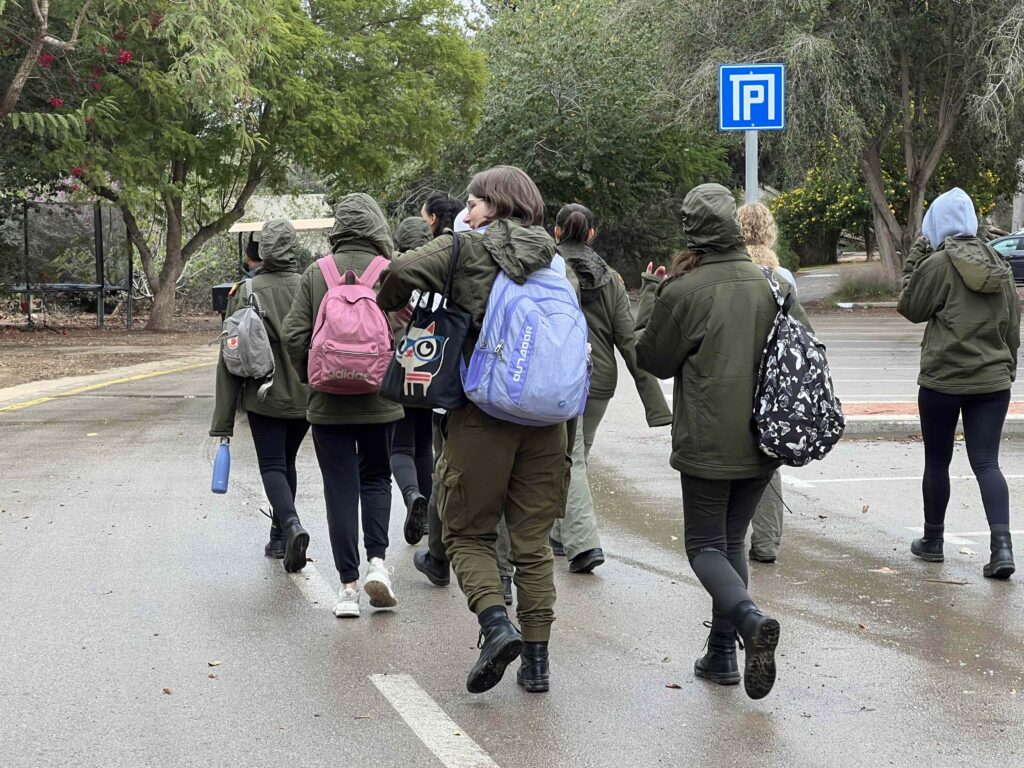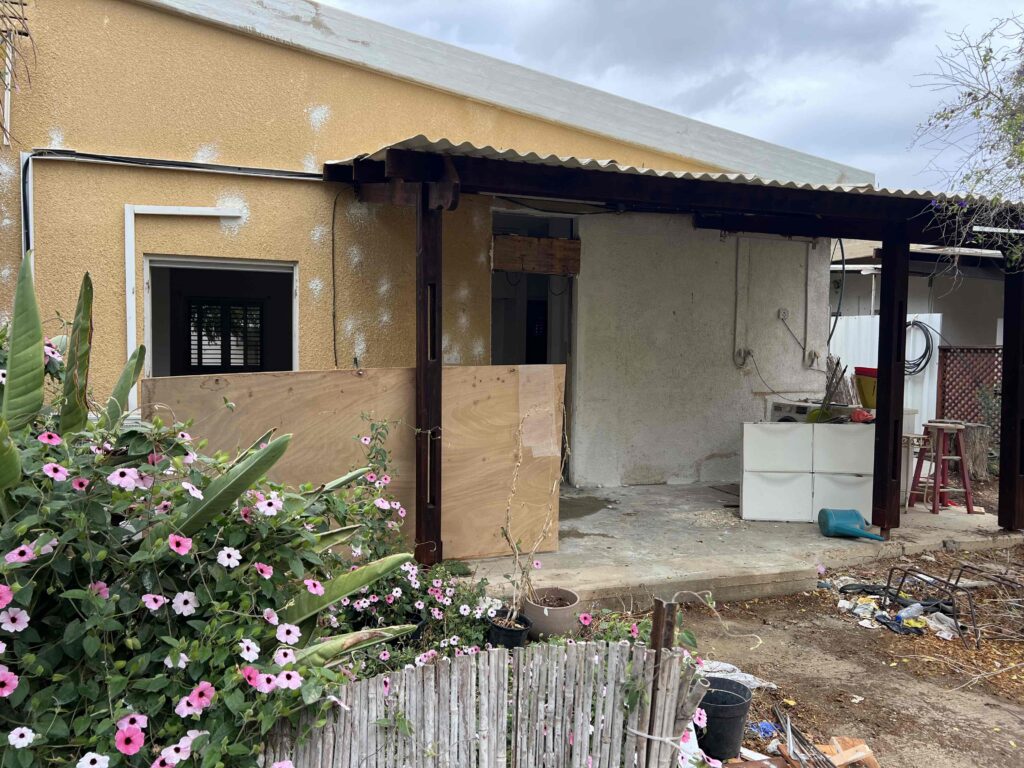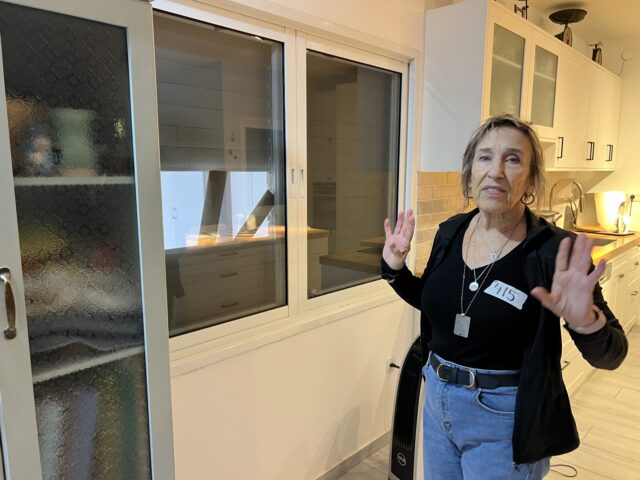KIBBUTZ NIRIM, Israel — Adele Raemer shows me the broken slats in the shutters outside her front window.
Hamas terrorists had begun breaking into her home on October 7, as she and her son hid in the “safe room” inside. Suddenly, someone called the terrorists away, and they left.
After eleven hours in hiding, she and her son would be rescued. But they were lucky.
Hamas terrorists murdered five residents of the kibbutz and abducted five more — three women, who were freed last November, and two men, who were executed. They destroyed 30 homes and damaged 45 more.
They killed the first three Israeli soldiers on the scene, including a senior officer, Col. Asaf Hamami.
Had it not been for the fact that a Hamas mortar had inadvertently disabled the back gate of the kibbutz, there would have been more dead, more hostages.
Today, Raemer is back in Nirim — not to mourn, but to rebuild, and — hopefully — to move back.
As we sit in her living room, there is a knock on the door: volunteers have arrived to help prepare her house for repainting. The volunteers are all female Israeli soldiers, all new immigrants from abroad.

IDF soldiers arrive to help repaint Adele Raemer’s home in Kibbutz Nirim, November 24, 2024 (Joel Pollak / Breitbart News)
A fresh coat of paint will soon be on the walls — a symbol of a fresh start.
Elsewhere on the kibbutz, there are signs and sounds of construction and renovation. Life is returning to Nirim, after so long.
Some homes could not be saved; they were razed to the ground earlier this year. But they will be rebuilt. And others are being repaired — bullet and shrapnel holes re-plastered, wooden doors replaced with reinforced steel, for security.

A home with bullet and shrapnel holes is renovated in Kibbutz Nirim, November 24, 2024. (Joel Pollak / Breitbart News)
Raemer is one of the residents who has already returned to the kibbutz to help restore it.
On October 8, 2023, she and those who survived among the kibbutz’s 430 residents were evacuated to a hotel in Eilat, where they spent several months. Later, members of the kibbutz moved to several apartment complexes in the nearby city of Be’er Sheva. They struggled to maintain communal life there, and are now facing the fraught decision about whether to return, as a whole.
Yet even if some residents are apprehensive, the majority want to come home, Raemer says. They will need to be reassured by the army that this time, they really will be safe, even with Gaza still two kilometers away.
But some portions of the kibbutz have already returned to something like normal life: the kibbutz’s dairy farm, Raemer notes, was back up and running within 24 hours of the terror attack. And the schools intend to open onsite early next year.
Much international media attention has focused — understandably — on the destruction wrought by Hamas on October 7. The nearby community of Kibbutz Nir Oz, which Breitbart News visited last November, was decimated.
But Raemer, a retired teacher, is focused on the future. Growing up in the Bronx, she says, and learning about how Jews hid from the Nazis, she could not have imagined hiding from contemporary Nazis in her own home. She immigrated to Israel in 1973, after the Yom Kippur War, but did not think it possible Israel could be surprised again.
Only her daughter, Lilach, had worried about a terrorist infiltration: for her, the Hamas attack was a “nightmare” come true.
Still, Raemer says, she feels safer in Israel than anywhere else — especially given the rise of global antisemitism.
“I don’t think there’s any place better or safer for Jews to live than in Israel,” she tells me. “I believe my life here is so much more meaningful than it would have been, living in the States. I have no question about moving back here.”
She is less optimistic about the prospects of peace with her neighbors in Gaza. Once a self-described peace activist, with contacts on the other side of the border, she says that the lesson of October 7 is that there is no partner for peace — at least not yet.
For now, she says, a two-state solution is premature: it would simply be a “reward for terror.” The only way forward, at the moment, is for Israel to take its destiny in its own hands.
“This is hope,” she says, gesturing at the activity around her.
She is proud of how the people of Israel — not the government, and not even the military — rose to the challenge of October 7 and the days that followed.
To her, that is the ultimate security — and the foundation for what is to follow.
Joel B. Pollak is Senior Editor-at-Large at Breitbart News and the host of Breitbart News Sunday on Sirius XM Patriot on Sunday evenings from 7 p.m. to 10 p.m. ET (4 p.m. to 7 p.m. PT). He is the author of The Agenda: What Trump Should Do in His First 100 Days, available for pre-order on Amazon. He is also the author of The Trumpian Virtues: The Lessons and Legacy of Donald Trump’s Presidency, now available on Audible. He is a winner of the 2018 Robert Novak Journalism Alumni Fellowship. Follow him on Twitter at @joelpollak.

COMMENTS
Please let us know if you're having issues with commenting.